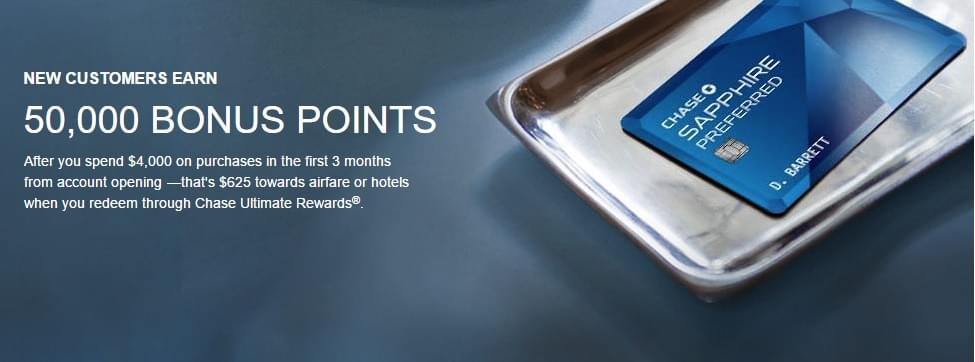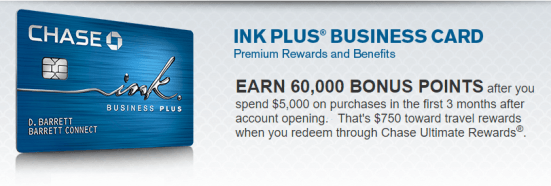
Chase’s Ultimate Rewards is one of the most lucrative programs for frequent travelers due to its generous sign-up bonus, the ease of
You have a choice of several cards that earn Ultimate Rewards. Let’s talk about which is the right card for your wallet.
Chase Sapphire Preferred
Many points collectors will tell you that Chase Sapphire Preferred is the absolute best card to have in your wallet due to its impressive sign-up bonus of 50,000 points after spending $4,000 in the first three months, double points on travel and dining, and no foreign transaction fees. There is also no annual fee for the first year, though you will be charged $95 annually after that.
For earning, this card is a solid choice. When you first get the card, you’ll receive the sign-up bonus as well as 5,000 points for the first authorized user you add to your account. Those points are added to your balance once that authorized user makes a purchase within the first three months.
Even if every dollar of your initial $4,000 of spend were in a single UR point earning category, you’d still get 59,000 points. If every dollar of that initial spend was on travel or dining, you would earn 63,000 points. If any of that spend was via the Shop through Chase portal, you could potentially earn even more.

Chase Sapphire Preferred is the right card for you if you frequently purchase travel, such as airline flights, monthly bus/train fare, subway fare and hotel stays, or dine out. It’s also a solid card if you often travel abroad since there is no foreign currency conversion fee.
Chase Freedom
Chase Freedom is also a solid choice for a personal credit card since there is no fee and you can earn 5 points per dollar in predetermined categories each quarter at up to $1,500 per spend. It’s also true that the card has no annual fee. That’s very unusual for a rewards credit card.
There are some caveats with this card, though. If you don’t also have the Chase Sapphire or Ink Plus card, you can only earn 1 percent cash back for normal spending on the Freedom card, and 5 percent cash back for the 5x bonus categories that are announced each quarter.
However, if you pair your Freedom card with the Sapphire or Ink Plus, you can select from cash back or move the rewards as points to your other card. That means you can now transfer those points to various airlines and hotels—a very powerful perk. Therefore, to really get the full bang for the buck with the Freedom card, be sure to also carry either Sapphire or Ink Plus.

The current sign-up bonus for Chase Freedom is $150 after you spend $500 on purchases in the first three months. You can earn another $25 bonus when you add your first authorized user and that person makes his/her first purchase within the same three-month period.
Chase Sapphire Preferred is the best card for earning If you need a no-cost
Ink Plus Business
Business owners really need to carefully consider Chase’s Ink Plus Business Card. The current sign-up bonus of 60,000 points is one of the highest you’ll find these days. You have to spend $5,000 in the first three months of having the card to get the points.
Like Chase Sapphire Preferred, there are no foreign transaction fees, but the card really shines in its everyday spending bonus categories. You’ll get 5x points per dollar on up to $50,000 annually in combined purchases at office supply stores like Staples, as well as on cell phone, internet and cable TV service. You’ll earn 2x points per dollar for up to $50,000 at gas stations and hotels. All other purchases earn one Ultimate Rewards point per dollar, with no limit on the number of points you can earn.

Ink Plus also offers free trip cancellation/trip interruption insurance as well as protection for purchases. Extended warranty protection and return protection are also included for purchases made on the card.
Chase Ink Plus Business might be the best card if you spend a lot at office supply stores or have large cell phone, landline, internet or cable TV bills. Likewise, the points per dollar at gas stations and hotels can really add up if you’re on the road a lot.
Three Chase Ultimate Rewards Products at a Glance
| Freedom | Sapphire Preferred | Ink plus Business | |
|---|---|---|---|
| Type of Card | Personal | Personal | Business |
| Sign-up | Earn a $150 bonus after you spend $500 on purchases in your first 3 months from account | 50,000 after you spend $4,000 on purchases in the first 3 months from account opening | Earn 60,000 points after you spend $5,000 on purchases in the first 3 months after account opening |
| Annual Fee | $0 | $0 intro annual fee for the first year, after that $95 | $95 |
| Points Perks | Earn 5% cash back on up to $1,500 in combined purchases in bonus categories each quarter you activate and unlimited 1% cash back on all other purchases | 2x points on travel and dining at restaurants. 1 point per dollar spent on all other purchases | Earn5x points per $1 on the first $50,000 spent in combined purchases at office supply stores and on cellular phone, landline, Internet and cable TV services each account anniversary year; earn 2x points per $1 on the first $50,000 spent in combined purchases at gas stations and hotel accommodations when purchased directly with the hotel each account anniversary year; earn 1 point per $1 on all other purchases - with no limit to the amount you can earn |
| Authorized User Bonus | Earn a $25 bonus when you add your first authorized user and make your first purchase within this same 3-moth period | Earn 5,000 points after you add the 1st authorized user and make your first purchase in the 1st 3 months from account opening | None |
Redeeming Chase Ultimate Rewards Points
You can redeem Ultimate Rewards points earned through each of these cards in the same way. But remember that in order to redeem points earned on your Freedom card, you must also have either the Chase Sapphire or Ink Plus card. Otherwise, you’ll only be able to redeem for cash back, and not for travel. You also won’t be able to transfer points to airline or hotel programs.
Transfer Partners
You can transfer your Chase Ultimate Rewards points to these loyalty programs:
- Airlines: British Airways, Korean Air, Singapore Airlines, Southwest, United and Virgin Atlantic
- Hotels: Hyatt, IHG, Marriott and Ritz-Carlton
You can also redeem points for 1.25 cents per point on paid travel booked through Chase’s website. Just be aware that you generally get a better value by transferring points to an airline or hotel.





